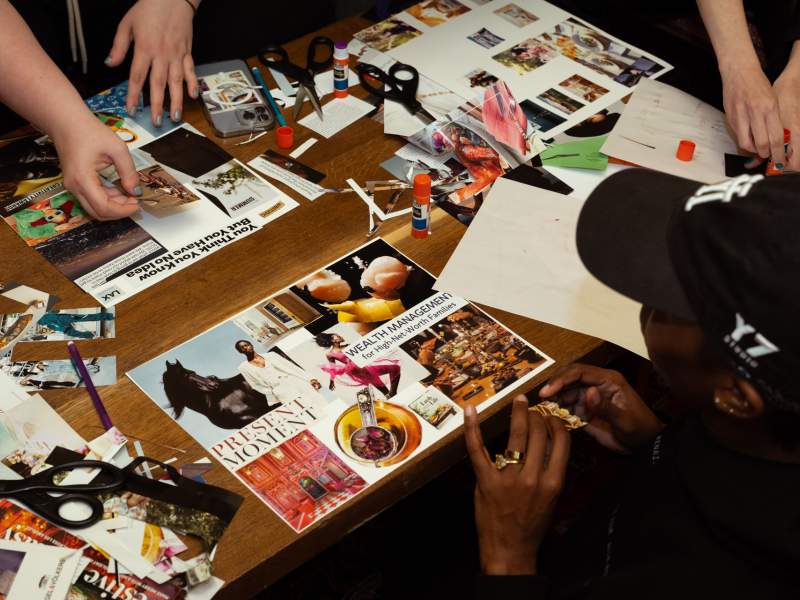From Resolution to Reality: Five Earth-Friendly Habits You Can Start Today and Continue for Life
Ring in the new year with tangible and sustainable resolutions that plant seeds for an Earth-friendly future.
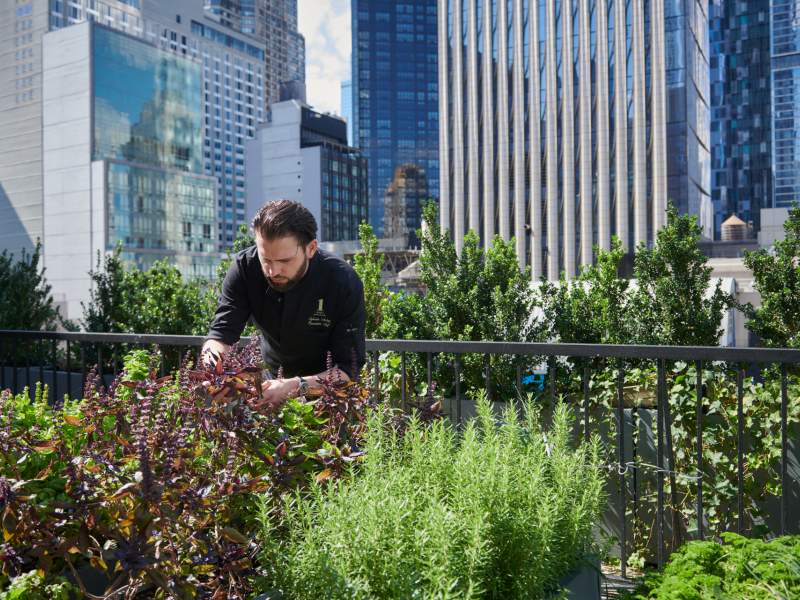
With the new year comes the promise of a fresh start, and there’s no better time to commit to new habits that safeguard the planet. While adopting new sustainable practices can feel daunting, we’ve curated a list of five realistic resolutions that you can start today—and maintain for life. From in-home composting guidance to sustainable shopping tips, we invite you to take your favorite resolution from this list and cement a new habit that will have positive impacts for years to come.
As you read this article and dive into new sustainable habits, we encourage you to share your knowledge and methods with your friends, family, neighbors, and followers. You have the power to generate a ripple effect of positive change in your community, and sharing your journey is one of the best ways to inspire others to join the movement.
GET COMFORTABLE WITH YOUR LOCAL RECYCLING GUIDELINES.
Let’s face it, recycling can be confusing. With rules and regulations that vary by country, state, and city, it can be hard to keep track of everything. Are you doing it right? Can you recycle the plastic cap with the bottle? Do you have to separate them? Can you include the plastic trash bag with the recycling? If you make a mistake, do all of your recycling efforts go to waste? Well, we’re here to set the recycling record straight.
First things first, recycling is as important as ever. Although it requires effort and intention, it is worth it. Project Drawdown, the world’s leading resource for climate solutions, estimates that recycling will reduce CO2 emissions by up to six gigatons between 2020 and 2050. That’s equivalent to removing over one billion cars from the road for a year.
Now, why are there so many rules? Different recycling facilities can handle different items based on their equipment lineup. The reason you can’t recycle plastic grocery bags, trash bags, or contaminated items (like a messy peanut butter jar or greasy pizza box) is that they can contaminate the other items or damage the recycling machinery. This is why it’s so important to truly understand the recycling requirements in your area. Here’s how you can do just that.
- Reduce and reuse first. We encourage you to view waste and recycling as a last resort, so you can uncover new opportunities to upcycle your items. Whether it's repurposing pasta sauce jars as flower vases or continuing to reuse produce bags at the grocery store, get creative with upcycling before you look to recycling.
- Find your facility. When it comes to recycling everyday items, you can start by searching “my recycling facility” to find your specific facility and what they accept. We recommend printing out your facility’s guidelines and keeping them as a cheat sheet near your recycling bin.
- Identify recyclable plastics (by type or number). Many facilities will say “plastic bottles and containers #1 and #2. Be sure to identify which types of plastics your local facility accepts.
- Know which types of glass are acceptable, if any. Many facilities will not accept glass because it can harm employees and equipment. If they do accept glass, it’s usually a specific kind listed on your local facility’s website.
- Remove non-recyclable parts. Unless explicitly stated, your facility probably does not accept lids, caps, wrappers, liners, inserts, or similar items that come attached to the recyclable item.
- Don't make assumptions. If you’re unsure about an item, reach out to your local facility! Some items may seem acceptable (such as a paper coffee cup) when they really aren’t recyclable.
- Clean everything. If the item is a food package (or came in contact with food) make sure it’s clean before you send it to the facility, or it can contaminate other items.
- Don't bag it. Plastic bags (such as grocery or trash bags) can cause jams in the recycling machinery.
As you uncover local recycling requirements and methods, be sure to maximize your impact by sharing your new knowledge to get your neighbors on board.
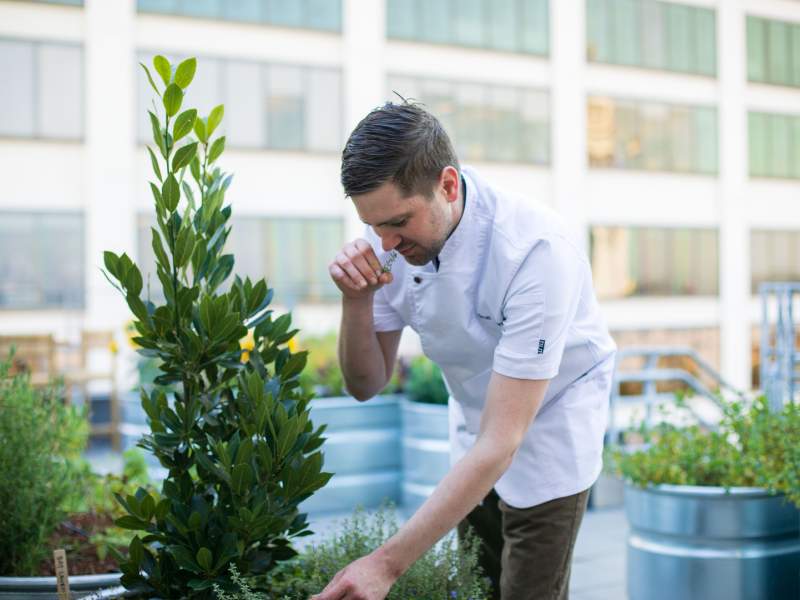
IT’S THYME TO GROW YOUR OWN HERBS.
The herbs you find in the supermarket come from all over the world (often inside plastic containers). Like many other groceries, it takes a lot of time and transportation to get them from the source into your hands. And once you harvest the herbs from the main plant source, they begin to lose nutritional value.
The good news? There’s a simple answer to all of this: you can easily grow your own herbs.
Whether you’re in a big home or small space, you can grow a year-round supply of herbs at home. All you need is a small balcony, doorstep, or windowsill and a little sunshine and water. The most important thing is simply remembering to harvest the herbs as they grow.
This Reel tells you everything you need to know about starting your own mini herb garden on your doorstep, patio, or balcony. If you’re growing your herbs inside, you can follow this guide that explains which types of herbs to choose and how to care for them indoors. It’s also worth noting that conventional, non-organic soils only contain about 2-4% organic matter, so opting for organic soil can produce more nutrient-dense herbs. This article outlines four organic soils that are perfect for your herb garden and some key things to look for (like specific ingredients) when shopping for soil at your local store.
With the right soil, care, and conditions, your indoor herbs will eventually outgrow their containers, and you can transport them to larger pots to grow outside in the warmer months. If you don’t have outdoor space, you can give them to a friend who does!
Note: As you nurture your green thumb, remember that using a watering can and exploring rainwater collection can reduce your water consumption. You can continue to reduce your water consumption by addressing leaks around your house and taking shorter showers.
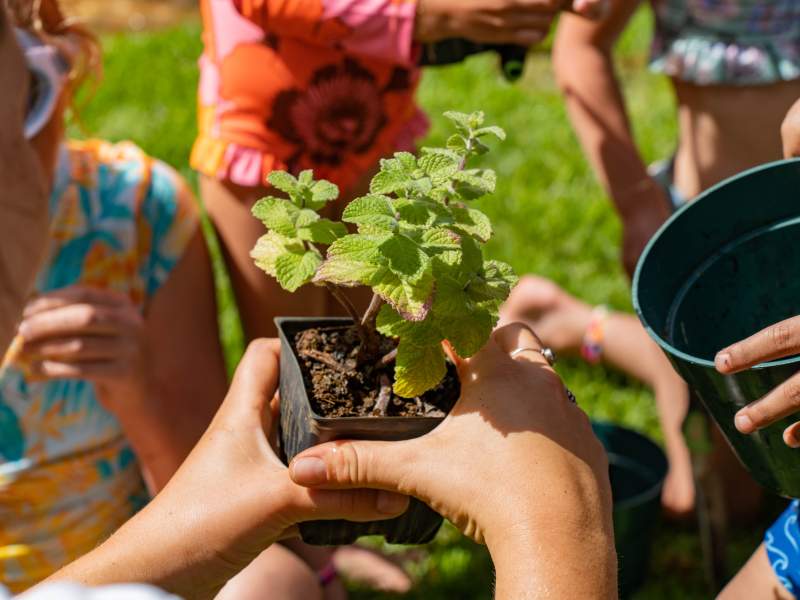
COMMIT TO COMPOSTING.
There are so many benefits to composting. By repurposing organic matter, it can improve soil health and structure, attract beneficial organisms to the soil, reduce the need for fertilizers and pesticides, and reduce landfill methane emissions. In the US alone, wasted food generates about 58% of landfill methane emissions, so widespread composting can drastically reduce this figure.
Many people believe that composting requires a yard, a large bin, warm weather, and lots of knowledge. The truth is, you have lots of options when it comes to composting! You can start a compost bin in your home without expert knowledge—no matter the season. Here are a few tips and resources to get you started.
- Research composting options in your city. If you live in an urban area, this might be the simplest solution! Try searching “[city name] composting program” to see if your city offers easy solutions. If they don’t, you can search “composting near me” to find independent businesses (local gardens, farmers, etc.) that offer pick-ups, drop-offs, guidance, and more.
- Try indoor micro-composting. You can find small self-contained compost bins that fit under your sink. With this method, you can use your compost to nourish the soil in your own garden or drop it off at a local facility or independent business.
In our interview with Copia’s VP of Customer Success, Paige Sullivan, you can also find tangible tips and insights to help you reduce food waste in your home.

TAKE INVENTORY OF YOUR SHOPPING HABITS.
We live in a world where you can make purchases in just a few clicks, but this effortless experience has had serious impacts on the environment. Trend-based online shopping has fueled fast fashion, leading to unethical working conditions, the use of toxic materials, and increased global pollution throughout the supply chain.
To avoid contributing to this, we invite you to start by taking inventory of your shopping habits. Are you online ordering things that you could easily pick up nearby? Are you acting in the moment instead of thinking about the true need and lifecycle of your purchase?
To break these habits, you can set up new systems to reduce impulsive or unsustainable purchases. Your system might consist of new sustainable habits such as:
- Making wish lists instead of immediately buying
- Seeking alternative products made locally
- Explore shopping apps such as Good On You that rate and organize ethical companies, so you can seek out brands that align with your values
- Documenting your outfits to better understand your style and know when you’re being “influenced” vs. making an aligned purchase (that will transcend fads)
All of these things can help you avoid impulse buying and cultivate more intention around your purchases, which can have lasting positive impacts on the planet.
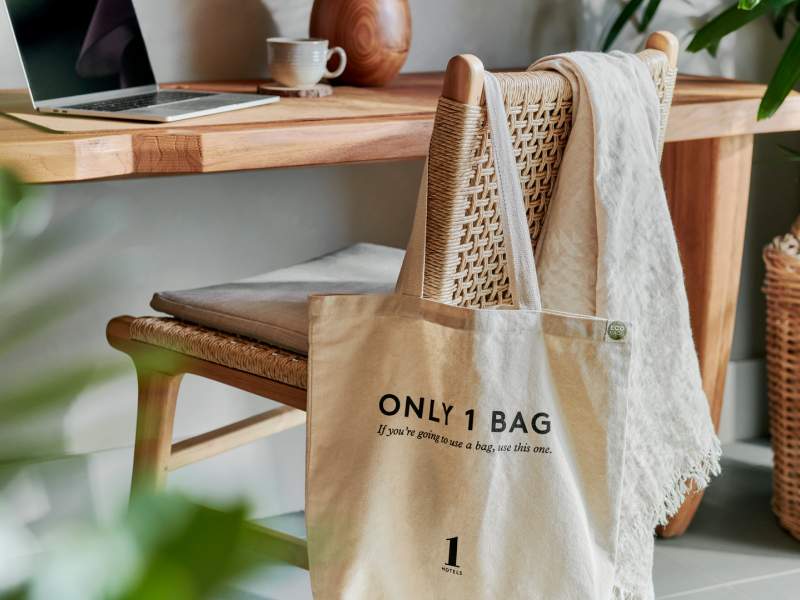
START WITH ONE SUSTAINABLE “SWAPPORTUNITY.”
Replacing just one disposable item in your household can have a significant positive impact on the planet. Not only do these items add up over time, but when you successfully swap them for a more sustainable item, it can inspire you to do the same for other products in your house.
When it comes to swapping out unsustainable items, think about which items you use the most. Do you find yourself blazing through paper towels in the kitchen? Do you throw away countless plastic baggies? You know yourself best, but to get you started, we’ve included some common items and swaps below.
- Paper towels: The EPA estimated that Americans threw away 3.8 million tons of paper towels and tissue paper in 2018. To avoid contributing to this, we recommend swapping disposable paper products with cloth towels you can throw in with your regular laundry.
- Sponges: Conventional sponges are typically made with synthetic plastic fibers that can enter the environment by going down the drain or sitting in landfills. Like many plastics, they can take hundreds of years to decompose. Instead of a plastic sponge, opt for a sustainable sponge made from plant fibers or an organic dishcloth.
- Plastic bags: In place of plastic bags, invest in infinitely reusable silicone bags. Stasher is a popular brand with many different designs for various needs.
- Laundry and dishwasher pods: Instead of using plastic pods (that break down and dissolve into your clothes and dishes), try using tablets or liquids made with natural materials. There are plenty of plastic-free dishwashing and laundry tablets that are better for you and the planet!
- Toothbrushes: Yearly, an estimated 30 billion toothbrushes end up in landfills worldwide. To directly combat this, we recommend switching to a biodegradable bamboo toothbrush.
- LED light bulbs: swapping fluorescent lights with LED bulbs can drastically reduce energy consumption in your home, as LED bulbs require far less power than fluorescent lights and convert 95% of their energy to light (wasting only 5% as heat). To continue conserving energy in your home, we recommend conducting an energy audit, unplugging electronics when you’re not using them, and going easy on your thermostat (using blankets or opening the windows depending on the weather).
There are so many more items you could add to this list, so be sure to keep an eye out for easy swaps in each room of your house.











